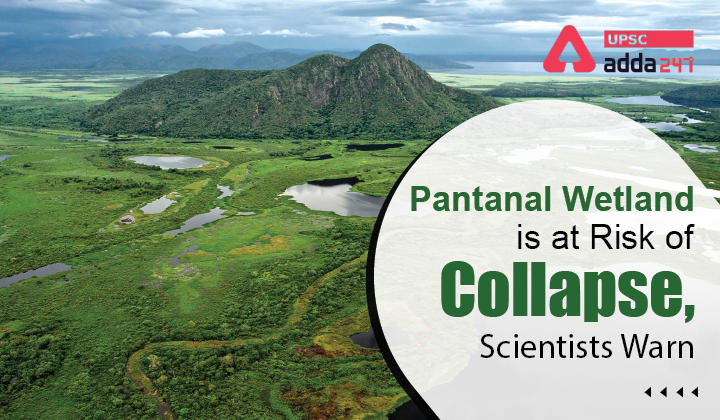Table of Contents
Pantanal Wetland UPSC: Relevance
- GS 3: Conservation, environmental pollution and degradation, environmental impact assessment.
Pantanal wetland: Context
- Recently, the scientists have warned that the world’s largest wetland, the Pantanal in South America, is at the risk of collapse due to a series of local and seemingly minor decisions.
पैंटानल आर्द्रभूमि के विनष्ट होने का खतरा है, वैज्ञानिकों ने चेतावनी दी
About Pantanal wetland
- The Pantanal wetland spans over 1.80 lakh sq km in Brazil, Paraguay and Bolivia and boasts one of the highest concentrations of flora and fauna in South America.
- Most of its land is used for traditional cattle ranching and fishing by local communities and sport fishers, with relatively little impact on its ecosystems.
- It is designated a National Heritage by the Brazilian Constitution and a restricted-use region whose use should be ecologically sustainable.
- The Pantanal is an ecosystem where the extension and duration of the seasonal floods are vital to maintaining biodiversity, traditional cattle ranching and resources used by local communities.
Issues in Pantanal wetland
- The scientists have cited a dangerous escalation over the past two decades in locally-made and legal land-use decisions and proposals to open up the wetland to more intensive uses that collectively threaten the long-term survival of the Pantanal.
- The scientists have also urged that its sustainable use of Pantanal must not be challenged by the faulty decisions, compromising the future of sustainable cattle ranching, fishing, ecotourism, traditional communities, biodiversity, and ecosystem services.
- The report warned that individual and local interests were detrimental to the collective interests of the conservation of the Pantanal, comparing the situation to the “tragedy of commons” or the “tyranny of small decisions.”
- The scientists were worried because of the increasing number of hydroelectric plants in the river basins forming the Pantanal wetlands, which may cause significant changes in the hydrology and nutrient intake in the ecosystems.
- The waterway may pose a substantial threat to the Pantanal due to its potential to negatively influence the hydrological signature of the ecosystems.
- Pantanal is also threatened by climate change on a global scale, deforestation in the Amazon rainforest and severe drought and massive fires.
- Moreover, more than 17 million vertebrates are estimated to have been killed immediately by wildfires that burned a quarter of the Brazilian Pantanal in 2020.
Read current affairs for UPSC




 TSPSC Group 1 Question Paper 2024, Downl...
TSPSC Group 1 Question Paper 2024, Downl...
 TSPSC Group 1 Answer key 2024 Out, Downl...
TSPSC Group 1 Answer key 2024 Out, Downl...
 UPSC Prelims 2024 Question Paper, Downlo...
UPSC Prelims 2024 Question Paper, Downlo...




